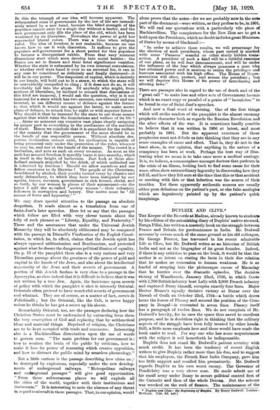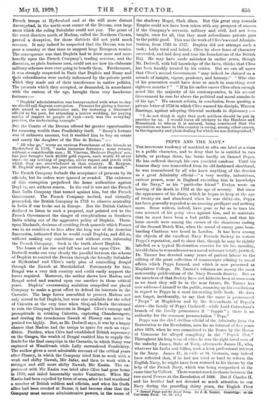DUPT.F.TX AND euvE. * Tux Keeper of the Records at
Madras, already known to students by his edition of the astonishing diary of Dupleix' native steward, Range Pillai, has written a masterly,book on the struggle between France and Britain for predominance in India. Mr. Dodwell necessarly covers much of the same ground as his old colleague, Sir George Forrest, has traversed in his recent admirable Life or Clive, but Mr. Dodwell writes as an historian of British India and not as the biographer of its great founder. Indeed, if there is any criticism to pass on the book, it would be that the author is so intent on stating the facts in their due relation that he makes no concession to human weakness. He is so fearful of straying into the picturesque excess of Macaulay that he hurries over the dramatic episodes. The decisive victory of Wandiwash, January 22nd, 1760, in which Coote with 1,700 British infantry beat Lally with 2,000 French infantry and captured Bussy himself, occupies exactly four lines. Major Hector Munro's equally decisive victory at Buxar over the Nawab of Oudh on October 23rd, 1764—a battle which drove home the lesson of Plessey and secured the position of the Com- pany in Bengal—is recounted in seven lines. Plaasey itself has a paragraph of twelve lines. We do not complain of Mr. Dodwell's brevity, for he uses the space thus saved to excellent purpose, and he is doubtless right in thinking that the military aspects of the struggle have been fully treated by other hands. Still, a little more emphasis here and there would have made the book easier to read. For any one who has some acquaintance with the subject it will henceforth be indispensable.
Dupleix does not stand Mr. Dodwell's patient scrutiny with much credit. It has been the tendency of recent English writers to give Dupleix rather more than his due, and to suggest that his employers, the French East India Company, gave him too little support and recalled him prematurely. Mr. Dodwell regards Dupleix as his own worst enemy. The Governor of Pondichery was a very clever man. He made adroit use of his small army under Bussy to secure political control first of the Carnage and then of the whole Deccan. But the scheme was wrecked on the rook of finance. The maintenance of the • Dupleix and Cite.: Lk* Barartise of prePire• Methuen. 112s. ed. net.)
By Henry Dodwell. London :
French troops at Hyderabad and at the still more distant Anrangabad, in the north-west corner of the Deccan, cost large sums which the ruling Subahdar could not pay. The grant of the coast districts north of Madras, called the Northern Circars, proved a deception, for those districts did not yield much revenue. It may indeed be suspected that the Deccan was too poor a country at that time to support large European armies. The consequence was that Dupleix had to draw more and more heavily upon the French Company's trading revenue, and the directors, as plain business men, could not see how his elaborate military schemes were ever going to benefit them. Furthermore, it was strongly suspected in Paris that Dupleix and Bussy and their subordinates were unduly influenced by the private profit
• which they made out of their interference in native politics.
The presents which they accepted, or demanded, in accordance with the custom of the age, brought them very handsome fortunes :—
" Dupleix' administration was honeycombed with what to-day we should call flagrant corruption. Presents for giving a favour- able award in an inheritance suit, for restoring a dismissed official to his post, for attending a native wedding, for paying marks of respect to people of rank—such was the everyday practice, the undeviating example."
But the Courts of the Deccan offered far greater opportunities for amassing wealth than Pondichery itself. " Bussy's fortune was of unknown amount, but it enabled him to buy an estate and marry the daughter of the Duo de Rohan " :— "All who go," wrote an envious Frenchman of his friends at Hyderabad in 1752, "make immense fortunes ; none returns without a considerable sum ; M. Vincens, Madame Dupleix' son, has just brought back 40,000 gold rupees, each worth 16 silver ones—to say nothing of pagodas, silver rupees and jewels with which thoy are overwhelmed in that country. M. Kerjean, M. Dupleix' nephew, has just arrived with at least as much."
The French Company forbade the acceptance of presents by its officials, but its orders were ignored or evaded. The existence of this corruption prejudiced the home authorities against Dupleix, not without reason. In the end it was not the French East India Company that turned against him, but the French Government. The French Company invited, and virtually persuaded, the British Company in 1753 to observe neutrality in India if war broke out in Europe. But the British Cabinet declined to listen to such a proposal, and pointed out to the French Government the danger of complications in Southern India arising out of the aggressive policy of Dupleix. There- upon Machault, desirous of avoiding fresh quarrels which France was in no condition to face after the long war of the Austrian Succession, intimated that he would recall Dupleix, and did so, without making any conditions and without even informing the French Company. Such is the truth about Dupleix.
The lesson of his rise and fall was not lost upon Clive. Mr.
Dodwell works out very clearly the parallel between the scheme of Dupleix to control the Deccan through the friendly Subahdar
at Hyderabad and Clive's early plan of controlling Bengal through the Nawab at Murshidabad. Fortunately for him, Bengal was a very rich country and could easily support the forces required. Moreover, the author shows how Madras and Bengal acted and reacted upon one another in those critical years. Dupleix' overweening ambition compelled our placid Company to make a great effort to defend its interests in the Carnatic. The large forces assembled to protect Madras not only served to foil Dupleix, but were also available for the relief of Calcutta at the very time when Siraj-ud-Daula threatened to ruin the Company's interests in Bengal. Clive's courage and promptitude in retaking Calcutta, capturing Chandernagore; and routing the treacherous Nawab at Plessey can never be praised too highly. But, as Mr. Dodwell says, it was by a happy chance that Madras had the troops to spare for such an expe- dition. Further, when Clive had established British supremacy on the Ganges, the wealth of Bengal enabled him to supply the funds for the final campaign in the Carnatio, in which Bussy was captured at Wandiwash while Lally surrendered Pondichery. The author gives a most admirable account of the critical years after Plessey, in which the Company tried first to work with a weak and shifty Nawab, Mir Jafar, and then to work with a stronger and still more shifty Nawab, Mir Moira. The ex- periment with Mir Kasim was tried after Clive had gone home In 1760, and failed lamentably under Vansittart. When Mir Kasim had been expelled by force of arms, after he had murdered a, number of British soldiers and officials, and when his Oudh allies had been crashed at Buxar, it had become clear that the Company must assume administrative powers, in the name of
the shadowy Mogul, Shah Alam. But this great step towards Empire could not have been taken with any prospect of success if the Company's servants, military and civil, had not been taught, once for all, that they must subordinate private gain to the public good. This was the work of Clive's second Adminis- tration, from 1765 to 1767. Dupleix did not attempt such a task ; Lally tried and failed ; Clive by sheer force of character succeeded, and laid deep and true the foundations of the British Raj. He may have made mistakes in earlier years, though Mr. Dodwell, with full knowledge of the facts, thinks that Clive has been harshly treated by his critics. But we can all agree that Clive's second Government "may indeed be claimed as a miracle of insight, vigour, prudence, and honesty." "Who else of his generation could have done as much in something over eighteen months ? " "If in his earlier career Clive often enough acted like the majority of his contemporaries, in his second Government he rose far above the political and moral standards of his age." We cannot refrain, in conclusion, from quoting a private letter of 1759 in which Clive warned his disciple, Warren Hastings, against adopting Oriental methods in diplomacy :—
"I do not think it right that such artifices should be put in practice by us. I would leave all trickery to the Hindoos and Mussalmen to who m it is natural, being convinced that the reputation we have in this country is owing, among other causes, to the ingenuity and plain dealing for which we are distinguished."











































 Previous page
Previous page